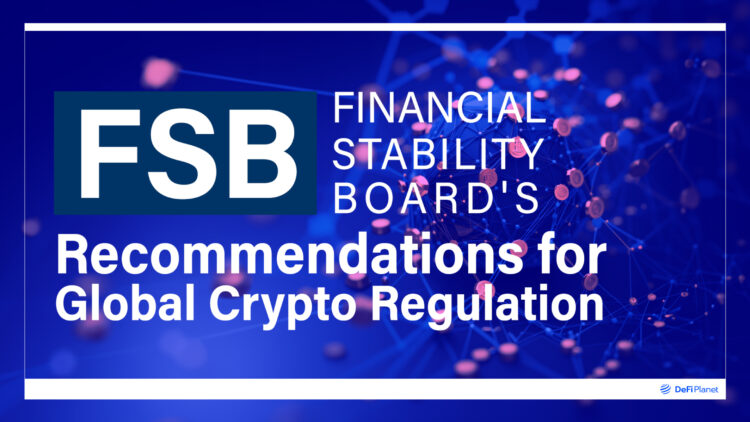The increasing popularity of crypto and the high-profile failures of a number of centralized crypto firms have raised concerns among global financial regulators about potential risks to financial stability, investor protection, and market integrity.
So, on 17 July 2023, the G20’s Financial Stability Board (FSB) published its “High-level Recommendations for the Regulation, Supervision and Oversight of Crypto-Asset Activities and Markets”. This follows the FSB’s consultation paper published in October 2022, as well as major corporate failures in the crypto space since then, for example, the sudden bankruptcy of prominent crypto exchange, FTX.
The stated aim of the recommendations is to:
“promote the comprehensiveness and greater international consistency of regulatory and supervisory approaches to crypto-asset activities and markets, including crypto-asset issuers and service providers”.
The FSB’s nine recommendations emphasize the need for appropriate powers for regulators, comprehensive regulatory frameworks, cross-border cooperation, and robust risk management and governance in the crypto sector. Below, we analyze each recommendation in turn.
Recommendation 1: Regulatory Powers and Tools
The recommendations emphasize the importance of regulatory authorities possessing and utilizing adequate powers, tools, and resources to effectively regulate and supervise crypto-asset activities and markets. Before commencing operations within a jurisdiction, crypto-asset issuers and service providers should meet all applicable regulatory requirements.
Regulators should be capable of enforcing these requirements, including undertaking inspections and requiring corrective actions when non-compliance is identified. Moreover, regulators should address risks posed by crypto-asset issuers and service providers attempting to evade regulation by operating in foreign jurisdictions.
This recommendation is sensible because crypto is a new and potentially transformative technology, including in financial services. Therefore, regulating crypto requires a careful and serious approach, backed by sufficient skilled resources and a legal framework defining powers, rights, and obligations.
Recommendation 2: General Regulatory Framework
This recommendation emphasizes the need for a comprehensive and
effective regulatory framework for crypto-asset activities and markets proportionate to the financial stability risks they pose.
Authorities should assess and adapt existing regulatory requirements to address the evolving nature of the sector and consider expanding their regulatory scope to include activities outside the traditional financial system (TradFi).
The goal is to ensure that regulatory outcomes in the crypto-asset market are equivalent to those in the traditional financial market, discouraging attempts to circumvent regulation.
In particular, the FSB recommends that crypto regulatory frameworks be based on the principle of “same activity, same risk, same regulation”. This is unsurprising as we often hear regulators talk about ‘same risk, same regulation’ or ‘same activity, same regulation’.
However, the extent to which this approach is appropriate will arguably depend on the context and is, therefore, open to debate. It is possible for major technological developments to fundamentally change the nature of an activity such that the risks – or the appropriate mitigation – are different from those adopted for other similar activities.
Recommendation 3: Cross-Border Cooperation, Coordination, and Information Sharing
To foster efficient communication and cooperation, authorities are encouraged to collaborate domestically and internationally.
Existing cooperation and information-sharing arrangements should be leveraged or new ones established, considering the cross-sectoral nature of some crypto-asset activities.
Cross-border cooperation should facilitate shared understanding and monitoring of risks in normal times and during periods of stress.
The FSB encourages regulatory authorities to collaborate when hosting crypto-asset issuers and service providers with global reach in order to mitigate potential spillovers into other jurisdictions.
Since crypto relies on the underlying technology of the internet, it is global by nature and doesn’t easily respect artificial barriers like nation-states. This creates an urgent need for international cooperation on the basis of a global framework of rules.
Recommendation 4: Governance
In this recommendation, the FSB stresses the significance of robust governance frameworks for crypto-asset issuers and service providers.
These frameworks should be proportionate to the risks posed by their activities, size, complexity, and systemic importance. Clear lines of responsibility and accountability, as well as measures to identify and manage conflicts of interest, are essential components of the governance structure.
After the FTX implosion, few people would argue about the need for centralized crypto service providers to be subjected to robust governance requirements. However, somewhat worryingly, the FSB appears to have little regard for one of the most important financial use cases for crypto, namely decentralized finance (DeFi).
“Where crypto-asset activities are conducted in ways that may frustrate the identification of the responsible entity or affiliated entities, such as through so-called DeFi protocols or setting up complex corporate structures, such conduct of activities must not undermine robust governance and accountability arrangements.
Authorities should require compliance with rules and regulations for effective governance irrespective of the structures of activities and technology used to conduct the crypto-asset activities.”
There is a risk that the FSB sees DeFi merely as a way to obfuscate governance requirements.
If this holds true, it would be a fairly damning indictment on the FSB’s understanding of DeFi as a concept, and of the potential for blockchain technology to revolutionize the traditional corporate concepts of ownership and control (for instance, via governance tokens or Decentralized Autonomous Organisations (DAOs), and thus how governance itself is done.
Recommendation 5: Risk Management
The FSB recommends that regulators require crypto-asset service providers to establish effective risk management frameworks proportional to their risks, size, complexity, and systemic importance.
This involves crypto firms being run by qualified and reputable management, and adequate resources being allocated to independent risk management and other control functions.
Crypto needs to inculcate the disciplines of enterprise risk management, including the concept of “Three Lines of Defence”.
Centralized crypto firms, in particular, require a systematic and intentional firm-wide view of risks and mitigation, which is dynamic enough to address the new and emerging threats and opportunities integral to such a fast-moving and innovative sector.
Therefore, it is positive that regulators should require crypto firms to effectively identify and manage risks, including those arising from leverage and credit, liquidity, operational, compliance, and maturity transformation.
Furthermore, crypto firms should identify, measure, evaluate, monitor, and control material risks, ensuring compliance with regulatory requirements and adherence to laws and regulations in normal times and in times of stress.
Recommendation 6: Data Collection, Recording, and Reporting
This recommends that regulators require crypto firms to implement robust data management systems and processes. The frameworks should comprehensively collect, store, safeguard, and timely report relevant data, accessible to regulatory authorities for effective regulatory oversight.
To promote public understanding, regulators are encouraged to consider consistent and comparable data collection and reporting standards.
For larger crypto firms (e.g., those that facilitate a wide range of trading services and a large size of trading volume), regulators are urged to think about the need for regulatory and public access to data on the most frequently traded instruments, the principal amounts traded, and the largest counterparties and intermediaries.
We agree that the availability of consistent data should be a key aspect of any robust crypto regulatory regime. It is important both for regulatory supervision purposes, as well as for market discipline.
Recommendation 7: Disclosures
This recommendation emphasizes comprehensive, clear, and transparent disclosure of information by crypto firms. Customers should have access to information regarding governance frameworks, operations, risk profiles, financial conditions, and product offerings.
Additionally, custody service providers should provide full disclosure to clients regarding custodial relationships, ownership rights, and safeguards to protect clients’ assets.
Given recent court battles following the failure of some firms, it is imperative that firms providing custody services are required to be clear about the terms and conditions of the custodial relationship and the risks that could be faced by the client if the custodian were to enter bankruptcy.
Recommendation 8: Addressing Financial Stability Risks Arising from Interconnections and Interdependencies
To maintain financial stability, the FSB recommends that regulatory authorities identify, monitor, and address interconnections and interdependencies within the crypto ecosystem and between the crypto sector and the wider financial system. This involves assessing the scale of crypto-asset activities and potential systemic risks they may pose.
Given past TradFi financial crises that have emanated from interconnectedness in financial markets, systemic risk should be an important focus of crypto regulation.
However, the FSB’s focus here is one-way only, i.e., risks from crypto to TradFi. But, as was observed recently in the U.S. regional banking crisis, the contagion may flow the other way too, i.e., TradFi risks may migrate to the crypto sector.
Recommendation 9: Comprehensive Regulation of Crypto-Asset Service Providers with Multiple Functions
This recommendation suggests comprehensive regulation of crypto firms that offer multiple functions and services. The FSB urges regulators to ensure that such providers and their affiliates are subject to appropriate supervision, addressing the risks associated with each function and the combined activities.
The FSB urges particular focus on firms combining multiple functions that facilitate custody, trading, settlement, lending, and borrowing or proprietary trading. Regulatory measures may well be required to ensure adequate segregation of risks.
This is an important point, given the potential for conflicts of interest between different functions. Like their TradFi counterparts, it is essential that crypto firms are subjected to detailed rules around the need for transparent organizational structures, compliance with sectoral standards, and robust measures to manage conflicts of interest.
Conclusion
- The FSB’s recommendations seek to comprehensively address the challenges and risks associated with crypto activities and markets. By promoting effective regulation, cross-border cooperation, and transparency, these recommendations aim to safeguard financial stability, protect investors and consumers, and enhance the overall integrity of the crypto-asset sector.
- These are important recommendations, especially given that crypto represents a novel and revolutionary technology with far-reaching applications in the financial sector (amongst others).
- Since multiple crypto regulatory frameworks are currently being developed across the world (e.g., UAE, EU, APAC, UK), the FSB has a role in helping to ensure some international consistency, especially given the global and borderless nature of crypto.
- A carefully considered regulatory strategy is imperative to effectively address the unique challenges and opportunities presented by crypto. In this light, it will be important to avoid knee-jerk reactions or rules based on an incomplete understanding of certain innovations, such as DeFi.
- Finally, ensuring sound regulatory frameworks entails equipping regulatory authorities with the necessary expertise and resources, bolstered by a robust legal framework encompassing powers, rights, and obligations. Only through such a comprehensive approach can we ensure the successful regulation of this dynamic and rapidly evolving sector and, in turn, see the crypto technology innovation fulfill its full potential.
If you would like to read more articles like this, visit DeFi Planet and follow us on Twitter, LinkedIn, Facebook, Instagram, and CoinMarketCap Community.
“Take control of your crypto portfolio with MARKETS PRO, DeFi Planet’s suite of analytics tools.”





















